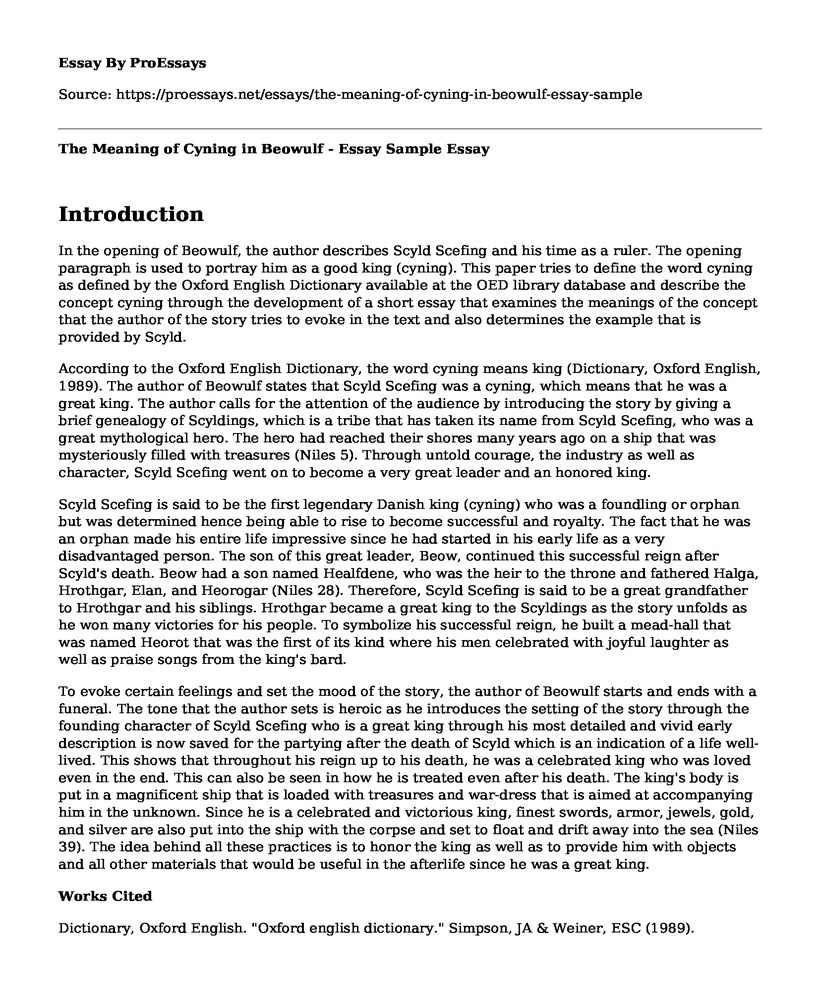Introduction
In the opening of Beowulf, the author describes Scyld Scefing and his time as a ruler. The opening paragraph is used to portray him as a good king (cyning). This paper tries to define the word cyning as defined by the Oxford English Dictionary available at the OED library database and describe the concept cyning through the development of a short essay that examines the meanings of the concept that the author of the story tries to evoke in the text and also determines the example that is provided by Scyld.
According to the Oxford English Dictionary, the word cyning means king (Dictionary, Oxford English, 1989). The author of Beowulf states that Scyld Scefing was a cyning, which means that he was a great king. The author calls for the attention of the audience by introducing the story by giving a brief genealogy of Scyldings, which is a tribe that has taken its name from Scyld Scefing, who was a great mythological hero. The hero had reached their shores many years ago on a ship that was mysteriously filled with treasures (Niles 5). Through untold courage, the industry as well as character, Scyld Scefing went on to become a very great leader and an honored king.
Scyld Scefing is said to be the first legendary Danish king (cyning) who was a foundling or orphan but was determined hence being able to rise to become successful and royalty. The fact that he was an orphan made his entire life impressive since he had started in his early life as a very disadvantaged person. The son of this great leader, Beow, continued this successful reign after Scyld's death. Beow had a son named Healfdene, who was the heir to the throne and fathered Halga, Hrothgar, Elan, and Heorogar (Niles 28). Therefore, Scyld Scefing is said to be a great grandfather to Hrothgar and his siblings. Hrothgar became a great king to the Scyldings as the story unfolds as he won many victories for his people. To symbolize his successful reign, he built a mead-hall that was named Heorot that was the first of its kind where his men celebrated with joyful laughter as well as praise songs from the king's bard.
To evoke certain feelings and set the mood of the story, the author of Beowulf starts and ends with a funeral. The tone that the author sets is heroic as he introduces the setting of the story through the founding character of Scyld Scefing who is a great king through his most detailed and vivid early description is now saved for the partying after the death of Scyld which is an indication of a life well-lived. This shows that throughout his reign up to his death, he was a celebrated king who was loved even in the end. This can also be seen in how he is treated even after his death. The king's body is put in a magnificent ship that is loaded with treasures and war-dress that is aimed at accompanying him in the unknown. Since he is a celebrated and victorious king, finest swords, armor, jewels, gold, and silver are also put into the ship with the corpse and set to float and drift away into the sea (Niles 39). The idea behind all these practices is to honor the king as well as to provide him with objects and all other materials that would be useful in the afterlife since he was a great king.
Works Cited
Dictionary, Oxford English. "Oxford english dictionary." Simpson, JA & Weiner, ESC (1989).
Niles, John D. Beowulf: The poem and its tradition. Cambridge, MA: Harvard University Press, 1983. Retrieved from: https://www.bpi.edu/ourpages/auto/2017/9/13/42764661/beowulf__raffel_translation_.pdf
Cite this page
The Meaning of Cyning in Beowulf - Essay Sample. (2023, Mar 17). Retrieved from https://proessays.net/essays/the-meaning-of-cyning-in-beowulf-essay-sample
If you are the original author of this essay and no longer wish to have it published on the ProEssays website, please click below to request its removal:
- Paper Example on Overall Value of George Orwell's 1984 in the Contemporary World
- The Fantasy of Being Young: Literary Analysis Essay on Oh To Be Young Again, I Think: A Poem
- How Views of Ophelia's Madness in Hamlet Have Changed Over Time - Essay Sample
- The Play Oedipus Rex Essay Example
- My Life as a Writer - Essay Sample
- Contemporary Society as Depicted in George Orwells 1984
- Essay Sample on A Rose for Emily: Faulkner's Southern Gothic Masterpiece







